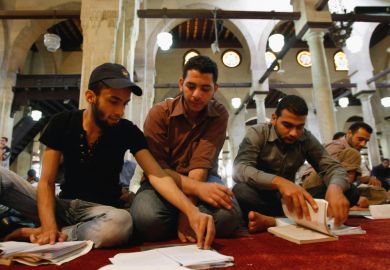Come to our MENA Universities Summit from 2-4 February 2016
Universities in the UK and Egypt have signed 10 partnership agreements aimed at building scientific research and increasing opportunities for student and staff exchanges.
The memoranda of understanding and letters of intent were signed on 20 January during the visit of an Egyptian higher education delegation to the UK, organised by the British Council. This follows a September 2014 visit by Egyptian government representatives, when it was announced that 2016 would be the “Egypt-UK Year of Research, Innovation and Education”.
The universities involved in the partnerships are: University College London (UCL) and New Giza University; King’s College London and the faculty of medicine at Cairo University; the University of Sussex and the faculty of economics and political science at Cairo University; Aston University and Cairo University; London South Bank University and Alexandria University; the University of Dundee and Alexandria University; Cardiff Metropolitan University and the Arab Academy for Science, Technology and Maritime Transport (AAST), Staffordshire University and AAST; Brunel University London and AAST; and Aston University and AAST.
Prior to the signing, Ashraf Mahmoud Hatem, secretary general of the Supreme Council of Universities in Egypt, told Times Higher Education that each of these partnerships would last at least three years and there is a target for 20 more agreements to be signed between UK and Egyptian universities in the next two years. These collaborations could include dual degrees, research work, student and staff exchanges and curriculum development, he said.
“For example, UCL is doing a partnership with New Giza University, which is a new private university in Egypt. It will help them to develop their own curriculum with the same international standards of UCL,” he said.
The Supreme Council oversees Egypt’s 24 public universities, regulates higher education and accredits foreign qualifications.
Dr Hatem added that three major projects will begin in Egypt this year with a view to implementation in 2019, as part of the country’s higher education reforms. These include the introduction of a funding and regulatory agency based on the Higher Education Funding Council for England; a national centre for assessment and evaluation based on the assessment agency at the University of Cambridge; and a training centre for leadership at Egyptian universities, modelled on the Leadership Training Centre in the UK.
He said the UK higher education system is a suitable model because it has implemented “tremendous change and reform” in the past 20 years, something that Egypt can mirror in its own development. He added that while English is generally the second language in Egypt after Arabic, it is the “first language” at universities, meaning it is easy for academics in the two countries to collaborate.
Tarek Shawki, chairman of Egypt’s Presidential Advisory Council for Education and Scientific Research, added that the government will officially launch a free digital library of academic journals on 23 January, as part of the president’s mission to transform Egypt into a “learning society”.
He said the Egyptian Knowledge Bank, which will be open to all members of the public in the country, will include English-language and Arabic-language scholarly books and journals published by 27 of the world’s leading academic publishers, including Elsevier, Springer and Thomson Reuters.
Register to continue
Why register?
- Registration is free and only takes a moment
- Once registered, you can read 3 articles a month
- Sign up for our newsletter
Subscribe
Or subscribe for unlimited access to:
- Unlimited access to news, views, insights & reviews
- Digital editions
- Digital access to THE’s university and college rankings analysis
Already registered or a current subscriber?







